Ex-Tehran Council Member Slams New Iranian Parliament
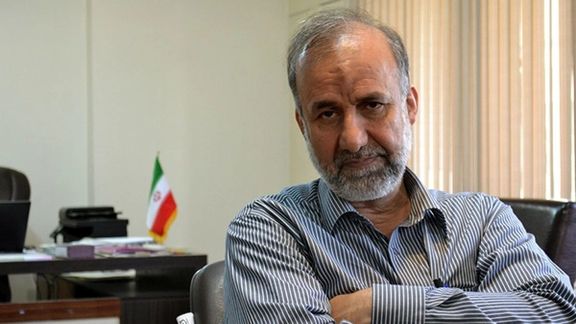
Hasan Bayadi, a former member of the Tehran City Council and a conservative political activist, has voiced criticism against the newly formed Iranian parliament.

Hasan Bayadi, a former member of the Tehran City Council and a conservative political activist, has voiced criticism against the newly formed Iranian parliament.
Speaking to Rouydad 24, Bayadi said: “With this combination of selected hardliners and sometimes shameless people, it's just the same parliament, and perhaps even worse than the previous parliament.”
Highlighting the record low public participation in the March elections, with a significant volume of invalid votes, he added: "In each period, we witness a decrease in participation compared to the previous one, but we see them congratulating each other for minimal public participation".
Bayadi also expressed concern over the influence of powerful networks supporting such actors, suggesting that “this poses a significant threat to the integrity of the electoral system and the democratic principles it upholds.”
The March 11 polls recorded a historic low turnout of just 41 percent according to the government, though figures are likely to be far lower than official statistics, closer to 10 percent.
Low turnout has been a matter of concern for Iranian authorities in the wake of the 2022 uprising, reflecting the dire lack of trust felt by the Iranian public in the state mechanisms.
Many Iranians, especially among the younger generation, feel disillusioned with the political system. They perceive that their votes may not bring about significant change or that the candidates do not represent their interests adequately.
The Guardian Council, a body of clerics and jurists, vets candidates for elected offices in Iran. This vetting process disqualifies many potential candidates, leading to a perception of limited choice.
Economic challenges, including high inflation, unemployment, and economic inequality, also led to apathy among voters who feel that their immediate economic concerns are not being adequately addressed by the political system.
Restrictions on freedom of speech and assembly, as well as the suppression of political dissent, have further created an atmosphere of fear and discourage political engagement from a people whose voices have been quashed by radical suppression.
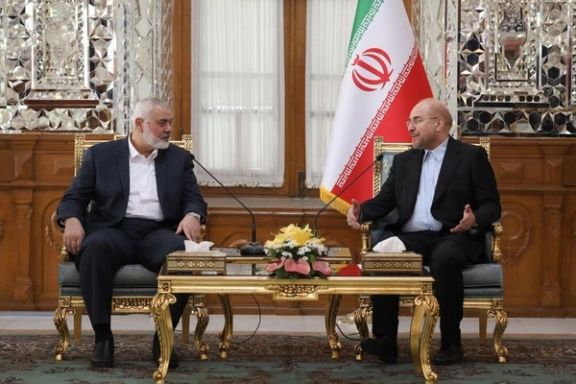
Ismail Haniyeh, the head of the Hamas political bureau, has met with Iran’s Parliament Speaker Mohammad Bagher Ghalibaf during his visit to Tehran, the latest in a string of high level meetings amid the war in Gaza.
"The issue of Palestine is one of the current concerns of the Iranian Supreme Leader. Therefore, we also support you in the parliament and provide the necessary support to the resistance front," Ghalibaf said during the meeting, Ali Khamenei having given birth to Iran's proxy militias around the Middle East.
"In addition, the support of other forces of the resistance front, especially Lebanon and Syria, in the fight against the Zionist regime, was very important," he added, referencing the attacks on Israel launched on other fronts, not only from Gaza by Hamas.
In 2018, US President Donald Trump’s special Middle East envoy Jason Greenblatt, claimed Iran provided $100 million annually to Hamas compared to $700m annually to Hezbollah.
Haniyeh, who arrived in Iran on Tuesday, held talks with key Iranian officials, including Supreme Leader Ali Khamenei, and Foreign Minister Hossein Amirabdollahian.
Ziyad al-Nakhalah, the Secretary-General of the Islamic Jihad Movement in Palestine, also met with Speaker Ghalibaf on Thursday. He also held a meeting with Khamenei on Thursday.
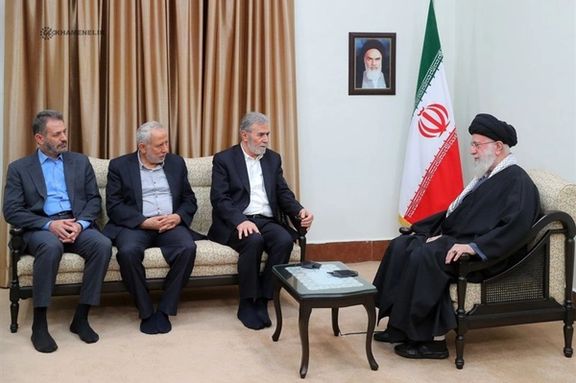
The meetings come against the backdrop of a recent United Nations Security Council resolution calling for an immediate ceasefire in Gaza, where Hamas has been engaged in conflict with Israel following its invasion of the Jewish state on October 7, killing 1,200 mostly civilians and kidnapping more than 250 others.
Haniyeh's visit marks his second trip to Iran since the outbreak of the war, the worst Gaza conflict since Hamas took control of the strip in 2007. Hamas claims around 32,000 people have been killed in Israel's retaliatory attacks in its bid to eradicate the terror group and rescue the remaining hostages.
While Lebanon’s Hezbollah is by far Iran's richest and most powerful proxy, the combined funds of the Palestinian Islamic Jihad Movement, Hamas and the Popular Front for the Liberation of Palestine are enormous, Hamas and Islamic Jihad receiving a large share of Tehran’s aid.
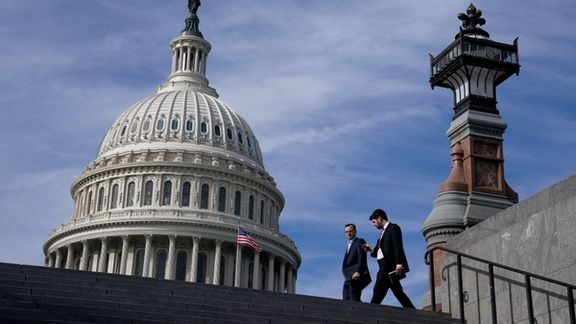
Amid controversy about President Joe Biden's recent stance on the conflict in the Middle East, two Republican lawmakers are calling for unconditional US support for Israel in a bid to battle Tehran’s regional proxies.
Tensions between US President Joe Biden and Israeli PM Benjamin Netanyahu have been deepening as Biden threatens to limit military support for the Jewish state in an attempt to reduce casualties in Gaza amid a humanitarian crisis.
August Pfluger, representative for Texas and a former Air Force F-22 fighter pilot, and Don Davis, representative for North Carolina and an Air Force veteran, wrote in the Washington Examiner that not only is Israel facing an existential struggle against Hamas, whose foundational charter calls for killing Jews and destroying Israel, "our ally is also confronting Iran’s region-wide network of terrorist proxies that attack Israeli civilians, US troops, and commercial shipping vessels".
They said: “In response, we should not only stand beside our partner as Israel defends itself against threats on multiple fronts, but we should also recognize that Israel’s victory against terrorism will be a victory against America’s adversaries and that we therefore must do our utmost to ensure Israel has everything it needs to prevail in this conflict.”
On October 7, Hamas, long backed by Tehran, invaded Israel, killing 1,200 mostly civilians and taking more than 250 hostage in the single most deadly day for Jews since the Holocaust.
Military veterans Pfluger and Davis noted the scores of attacks on US facilities around the Middle East which have followed the outbreak of the Gaza war in Iraq, Syria and more recently, on the Red Sea, punishment for its stance supporting Israel’s right to defend itself in the wake of October 7.
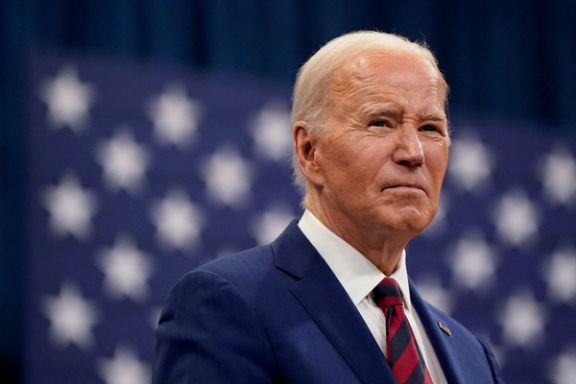
“America must stand beside its partners when they face barbaric attacks, especially when they are fighting enemies, such as Iran’s terrorist network, who are also intent on harming Americans.” Just weeks ago, three US troops were killed by Iranian-backed militia in Jordan as actions against US forces continue to pose deeper risks to troops in the region.
Israel’s response to the Hamas invasion, celebrated by the Iranian regime just hours after the attacks in spite of Tehran’s distancing itself from the operation, has led to what Hamas’s health ministry claims is over 30,000 deaths and aid groups say the strip is on the brink of starvation.
“It is Hamas, not Israel, that bears ultimate responsibility for the suffering and death in Gaza,” the military experts said. “The terrorist group has diverted a vast amount of humanitarian assistance meant for civilians to fuel its own war effort and enrich its leaders instead. It has fired at Palestinian civilians in Gaza fleeing the conflict zone. It hides terrorists and weapons around, in, and under homes, schools, mosques, and hospitals. The use of human shields is not only a war crime but also a cynical ploy.”
It is US support which allows Israel to conduct precise operations, the pair said, using the likes of US-provided precision-guided missiles for its surgical strikes, in addition to the life-saving interceptors for Israel’s Iron Dome missile interceptor system which has protected Israel from most of the 11,000 or more rockets rained down by Hamas, mostly provided by Iran.
“If cuts or conditions on US aid deprived Israel of either of these important munitions, there would only be more, not fewer, civilian casualties — on both sides … Unable to defend against these barrages, Israel would have no choice but to move aggressively and swiftly into all of Gaza to eliminate the launchers.
“Without PGMs, Israel would have to resort to not only using “dumb” bombs but would also have to drop more bombs than it currently does. The result would be far greater devastation of Gaza.”
This week, the US decision not to veto a UN Security Council resolution calling for an immediate ceasefire, has caused deeper rifts between the two countries, as the US election race heats up, the pressure from Democrats to ease support for Israel weighing heavy on the President.
Netanyahu immediately rejected the resolution’s demands, saying that the war aims continue. “Israel will pursue and achieve its just war objectives: Destroying Hamas's military and governmental capacities, release of all the hostages, and ensuring Gaza will not pose a threat to the people of Israel in the future,” he said on Tuesday.
The resolution also failed to address the issue of the more than 130 hostages still in Gaza. “Regrettably, the United States did not veto the new resolution, which calls for a ceasefire that is not contingent on the release of hostages,” the Prime Minister’s office said.
“This constitutes a clear departure from the consistent US position in the Security Council since the beginning of the war … [the] resolution gives Hamas hope that international pressure will force Israel to accept a ceasefire without the release of our hostages, thus harming both the war effort and the effort to release the hostages.”
In Biden’s presidential race, he had called proposals to condition aid “a gigantic mistake” and an “absolutely outrageous” idea. “He was right then, and he would be right now to reject attaching any strings to assistance for our strongest ally in the Middle East,” concluded the military vets.

Eleven women's rights activists in Gilan province, north of Iran, who were detained in August, have been collectively sentenced to more than 60 years in prison.
Mostafa Nili, the lawyer representing two of them, disclosed details on Wednesday. The women were each sentenced on charges including "membership in an illegal group," and “propaganda against the system."
Their arrests came just a month before the anniversary of Mahsa Amini's death in morality-police custody after being arrested for defying the mandatory hijab in September 2022.
The authorities often employ tactics such as arbitrary arrests, intimidation, harassment, and even violence to suppress opposition voices and maintain control. Human rights defenders, journalists, students, and members of minority groups are particularly vulnerable to persecution.
The government frequently justifies the crackdowns under the guise of national security or combating threats to the Islamic Republic's ideological integrity. Despite international condemnation and calls for reform, the Iranian regime continues to tighten its grip on civil liberties, creating a climate of fear and censorship that restricts freedom of expression and assembly within the country.
Since 2018, growing numbers of women have been arrested in Iran including activists, students, lawyers and even revolutionary insiders, such as Faezeh Hashemi, the daughter of former President Hashemi Rafsanjani, who criticized the regime or participated in protests.
Journalists have also suffered increasing crackdowns including the arrests of Niloofar Hamedi and Elahe Mohammadi, who were among the first to report the 2022 death of Mahsa Amini.
The regime has also imprisoned female lawyers who represented prominent activists, dissidents or political prisoners, according to the Center for Human Rights in Iran.
Rights group Amnesty International branded the crackdowns part of an "escalating crackdown to quash Iran’s civil society.” Lawyers and others affiliated with the Defenders of Human Rights Center advocacy group have been subjected to “excessive sentences and punishments for engaging in regular professional activities,” the organization said.
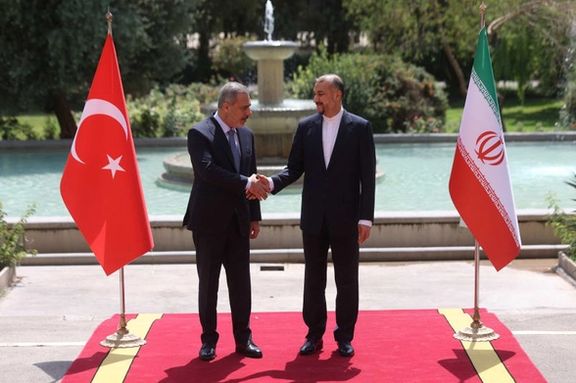
Pro-Iran Popular Mobilization Forces (PMF) of Iraq has given the green light to Baghdad and Ankara to eliminate the Kurdistan Workers Party (PKK) in Iraq.
Turkish Foreign Minister Hakan Fidan confirmed recent talks between Turkey and an official Iraqi institution funded by Baghdad, focusing on Sinjar, where the group has gained ground.
The news reflects Turkey's increasing involvement in Iraq, seeking to forge broader relations to quell longstanding tensions along its southern border, with the recent meeting held between the Turkish and Iraqi foreign ministers in Baghdad on March 13. Security officials, including PMF leader Faleh al-Fayyad and National Security Adviser Qasim al-Araji, were present.
Turkey expressed support for the formation of a 40-kilometer deep buffer zone aimed at eradicating the PKK, deemed a terrorist entity, stretching from Sulaymaniyah to the Syrian border via Sinjar.
Turkish President Recep Tayyip Erdogan is expected to travel to Baghdad in April. He is set to sign an agreement for the establishment of a joint operations command center and a buffer zone, according to Asharq Al-Awsat.
Meanwhile, Iraqi sources told the publication that with the presence of the PMF at the meetings, it signals Tehran's support for the Turks to act in Iraq.
According to the sources, Turkey's military plan calls for a broad operation in mountainous regions in the Kurdistan Region, while Baghdad provides intelligence support, maps and information and monitors the border.
Sulaymaniyah and Sinjar, however, lie on the outskirts of the Turkish buffer zone and intersect with Iranian interests, demanding that Ankara take different political and security arrangements over them.
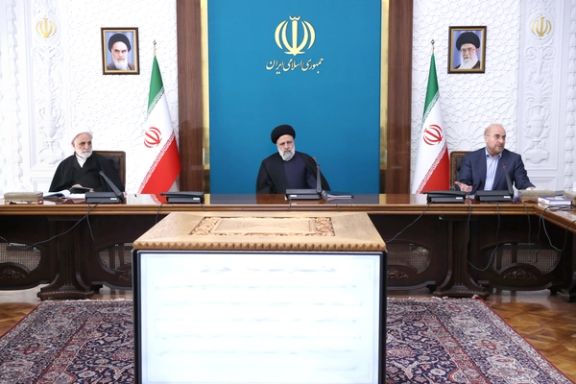
While enjoying their long Norouz holiday, politicians in Iran have been reflecting on the country's economic, social and political crises and anticipating a bleak situation in the year ahead.
Their reflections on the past are primarily centered around the recent highly controversial election, which the country sees as a nightmare that it has partially left behind. However, as the holidays conclude, the nation anticipates the continuation of this nightmare with a run-up election in May.
The heavily manipulated vote for parliament on March 1 saw hardliners barring most other regime insiders from running for office. As a result, the election experienced the lowest turnout in 45 years, with widespread public apathy keeping a large majority of voters away from ballot boxes.
Khabar Online website in Tehran conducted brief interviews with ten Iranian political figures, seeking their perspectives on the best and worst events of the Iranian year that concluded on March 20.
Among the respondents, which included former lawmakers, a former state TV Chief (Mohammad Hashemi), and various politicians from different affiliations, the overwhelming consensus identified the March 1 election as the most adverse event of the past year.
Former judiciary head Sadeq Amoli Larijani, who lost the Assembly of Experts election in Mazandaran Province, and Majles Speaker Mohammad Bagher Ghalibaf were highlighted as notable losers. Ghalibaf, who secured over 1.2 million votes in 2021, saw a drastic reduction to just over 400,000 votes in 2024. However, respondents highlighted that almost everyone in the country could be considered a loser.
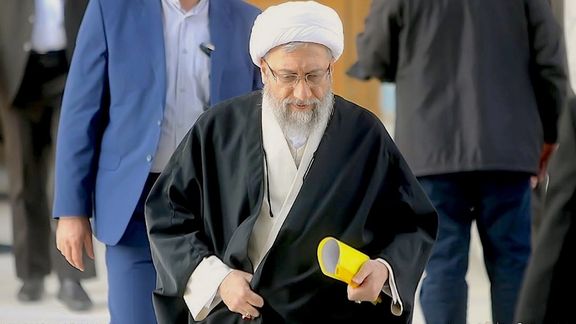
Reformist politician Gholam Ali Rajai expressed a sentiment shared by many, stating that even a destructive earthquake would have been preferable to the March 1 election. The devastation left behind by an earthquake could be compensated, but the losses caused by this election, which brought radicals to power, will have serious long-term consequences, he said.
Additionally, concerns were raised about the ongoing economic crisis under President Ebrahim Raisi's administration, as well as security issues highlighted by terrorist attacks in Shiraz and Kerman in the past year. Only one respondent, former presidential candidate Mostafa Hashemi Taba, singled out the government's neglect of environmental issues as the most significant failure of the past year.
When asked to grade the government's performance on a scale from zero to 20, opinions varied widely. While three hardline politicians, including Islamic Coalition Party member Hamid Reza Taraqqi, awarded grades between 14 to 18, others were far less generous, with two politicians assigning grades below 10, including two zeros.
Evaluating the performance of the outgoing parliament, except three hardline former lawmakers, the other seven respondents branded the parliament a total failure.
Meanwhile, three hardliners named the launching of a satellite to the space as the country's best event in the past year. Reformist Rajaei said winning the Nobel Peace Prize by jailed activist Narges Mohammadi was the best that happened to Iran last year.
Looking at the future, in another Interview, General Hossein Alai, a former commander of the IRGC naval Force and a reformist politician, said that the Islamic Republic needs to bring about a meaningful change in its economic and political policies and conduct.
Alai reiterated that significant changes are needed in the government's domestic and foreign policies as well as in the areas of economy and the way the government appoints its managers. He added that the government should do away with the arbitrary vetting of election candidates by the Guardian Council so that the people can believe that they can determine their own fate.